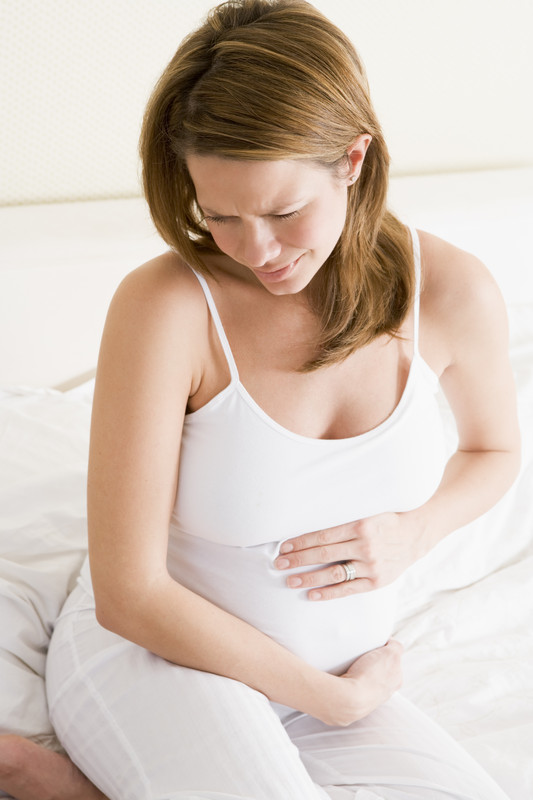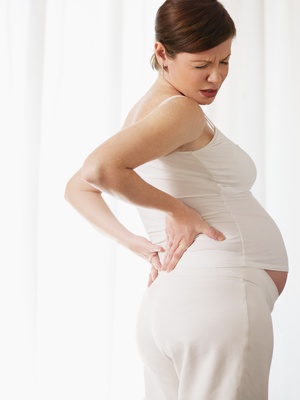Last menstrual period date:

Occasional pregnancy cramps are normal, do not panic! They are a reminder sent from your body to take it easy. But, sometimes they can be an alert for certain digestive problems or give out emergency signals for which you need urgent medical attention.
Which pregnancy cramps are harmless?
During this time your uterus is supported by muscles and ligaments. As your uterus grows more and more these links are being stretched and pulled in various directions. This may cause occasional abdominal cramps. Pain intensity can be mild or sharp and in some cases you can only notice them when you make sudden moves like getting up out of chair, sneeze, cough or run across the street. If you feel your cramps in such cases you have nothing to worry about. Some women feel pregnancy cramps while exercising because they put additional stress on their muscles at the moment. Cramps during exercise means you have to stop, your body needs to rest.
Poor digestion may cause cramps during your pregnancy time. If you are not eating right or you eat too much unhealthy food, you may become constipated and cramps can be very painful. Healthy diet and eating right may relieve cramping as well as increase and ease your digestion.
During the third trimester of pregnancy women are anxious to see their baby. The Braxton Hicks contractions are a false alarm that can send a woman to hospital for the right cause, but at the wrong time. Third trimester cramps are usually related to dehydration and in order to relieve the cramping you must drink plenty of fluids.
Serious problems caused by abdominal pain during pregnancy
Sometimes abdominal cramping can lead to more serious disorders and if you feel abdominal pain along with spotting, vagina discharge, bleeding or fainting do not try to diagnose yourself. Your body is giving you signs that you need to call your medical practitioner and seek for urgent medical attention.
Abdominal pain at this time can lead to serious problems such as ectopic pregnancy or miscarriage. A strong abdominal pain and pass date to menstrual cycle is a sign for ectopic pregnancy.
One of the first signs that lead to miscarriage is abdominal cramps during the first trimester. If a woman experiences abdominal cramping in this trimester she should be concerned about having miscarriage. Studies show that nearly 20% of women with abdominal cramping end in miscarriage.
Constant abdominal pain and cramping along with backache may lead to preterm labor. The contractions are accompanied with leaking blood, abdominal fluid and decreased fetal movement. Call your ob-gyn right away. Even the most experienced pros cannot recognize if contractions are Braxton Hicks or this is a true preterm labor. Now it is not the right time to diagnose yourself, because even if you end up with a false alarm, it’s better to be in safe hands.
Placental abruption is one of the most severe complications related to third trimester cramps. It starts with low abdominal pain, intense abdominal cramping, vaginal bleeding and the uterus becomes hard like a rock. If you experience these symptoms you have to call your medical practitioner right away. Women with placental abruption may go into labor, or if there is no time, the ob-gyn can deliver the baby by performing a cesarean section.
Tips to relieve cramping
Pregnancy cramping can lead to other serious complications, but they are usually accompanied with other signs. In order to relieve cramping you can:
- Drink lots of fluids;
- Exercise, but rest when needed;
- Eat fiber-rich foods including fruits, vegetables, bran;
- Empty your bladder;
- Eating right is important, small and frequent meals will help you increase your digestion;
- Rest more often.
In conclusion: our lifestyle has a great impact during our pregnant times. Sudden moves, wrong foods and too much exercise can lead to serious problems. Everything you eat, drink or do has to be in the normal range.





